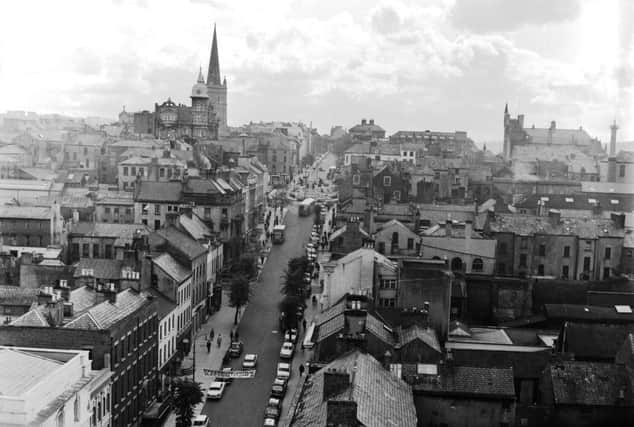New study looks at why Protestants left Derry's cityside


Poor housing, a scarcity of economic development and a lack of political leadership all contributed to the migration of Protestants from the west bank of the city, says the new study by human rights organisation, the Pat Finucane Centre (PFC).
The report, “Protestant Migration from the West Bank of Derry/Londonderry 1969-1980”, was commissioned by the PFC, written by academics Dr Helen McLaughlin and Dr Ulf Hansson and funded by the Department of Foreign Affairs in Dublin.
Advertisement
Hide AdAdvertisement
Hide AdIt concludes that a number of complex and often inter-related “push” and “pull” factors contributed to this Protestant migration, in particular between 1969-1980.
These include: a fundamental shift in the position of Protestants within the city; safety and security issues; poor and limited housing on the cityside and the availability of better housing elsewhere; the policy of skewing economic development and investment away from Derry and towards centres east of the Bann; lack of constructive leadership from unionist politicians.
Tony Brown, chairman of the PFC, says he hopes the report will be seen as “an uncomfortable but necessary contribution to a conversation that has, at times, been dominated by strident voices on one side and apathy on the other.”
In a foreword to the report, Mr Brown adds: “Some have argued that Protestants living on the west bank of the River Foyle in Derry were intimidated out of their homes, schools and workplaces in a deliberate campaign of ethnic cleansing led by the IRA since the early 1970s.
Advertisement
Hide AdAdvertisement
Hide Ad“The accusation, itself, of ethnic cleansing, could not be more serious, conjuring up, as it does, images of Bosnia or Burma. The perception that some of those making the accusation are themselves motivated by sectarianism has allowed the Catholic/nationalist/republican community in Derry to avoid the reality that thousands of their neighbours have left.”
Between 1971 and 1991, the cityside Protestant population plummeted from 8,459 to 1,407 - that’s a drop of 83%.
However, census figures for 1961 to 1971 show that the decline had already started with, for example, the Protestant population of the South Ward - which would have included the Bogside and Brandywell districts - falling by just under 45%.
This trend, says the report, coincided with a pattern of increased segregation across Northern Ireland.
Advertisement
Hide AdAdvertisement
Hide Ad“However, divided by the River Foyle, the impact appears more stark with an almost exclusively nationalist population on the west bank and only a tiny minority Protestant community left on the west bank,” says the report.
A “range of factors”, concludes the new report, influenced migration.
The position of Protestants in Derry, says the report, was becoming less certain and less comfortable than it had been before with “power imbalances” beginning to be redressed across a range issues. Nationalists gained control of the Council and the housing system was reformed to prevent discrimination and to permit new development. Symbolically, the close affinity which Protestants felt for the city centre was being challenged and a “sense of belonging and, indeed, ownership, eroded”.
See Tuesday’s Derry Journal for more.